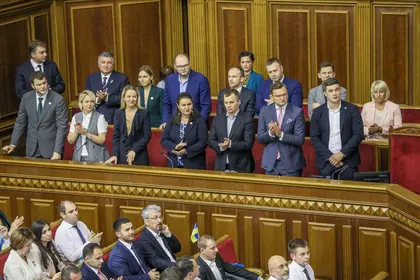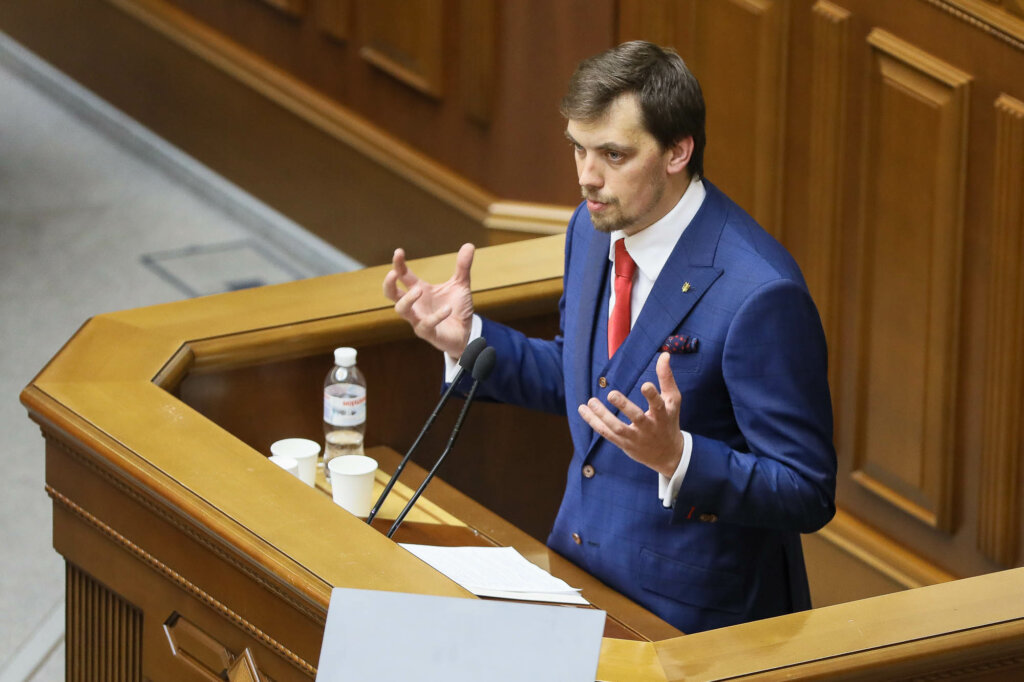Ukrainian parliament at its first meeting on Aug. 29 voted for the new prime minister and the Cabinet.
The new Cabinet includes 17 ministers, as opposed to 25 ministers that served on the outgoing Cabinet led by Volodymyr Groysman. Several ministries were disbanded and merged with others, such as the agriculture ministry, sports ministry, and ministry of occupied territories.
JOIN US ON TELEGRAM
Follow our coverage of the war on the @Kyivpost_official.
Here’s the full list of Ukraine’s new ministers:
Oleksiy Honcharuk, prime minister.
Until recently, Honcharuk, 35, was deputy head of President Volodymyr Zelensky’s office on economic development and reforms and often followed Zelensky during his recent travels to Ukrainian regions. Before that, he headed the Better Regulation Delivery Office, a European Union-funded think tank aimed at improving the business environment and Ukraine’s investment climate.
Lawyer by education, Honcharuk ran his own firm and was an adviser to Ihor Shevchenko, ecology minister, and Stepan Kubiv, economy minister. In 2014, Honcharuk also unsuccessfully ran for parliament from Syla Lyudey party, which received less than one percent of support.
Dmytro Kuleba, deputy prime minister in charge of European integration.
Kuleba, 38, is a Ukrainian diplomat. He has served as the permanent representative of Ukraine in the Council of Europe since 2016. Before that, Kuleba was a special envoy of the Ukrainian Foreign Ministry.
Mykhailo Fedorov, deputy prime minister and minister of digital transformation.
Fedorov, 28, ran a digital marketing agency before joining Zelensky’s presidential campaign as the head of digital operations. He went on to work in Zelensky’s administration as deputy chief of staff. The position of a minister of digital transformation is a new one.
Arsen Avakov, interior minister.
Avakov is the longest-serving Ukrainian minister, having been in the interior ministry since February 2014. He is the most controversial appointee in the new government. The civil society has had multiple protests in the recent months demanding Avakov’s resignation due to his ineffectiveness and suspected corruption. Before the vote for the government, Zelensky told his party’s lawmakers that Avakov has to stay, according to Prime Minister Honcharuk.
Andriy Zahorodniuk, defense minister.
Since July, Zahorodniuk, 44, has been appointed Zelensky’s defence adviser and member of the advisory board of Ukroboronprom state arms producer, which was involved in several corruption scandals. In 2014, he volunteered to help Ukrainian soldiers on the frontlines and in 2015 headed the Reforms Project Office of the Ministry of Defense aimed at reforming defence sector. He worked there along with another volunteer David Arakhamiya, who now heads Zelensky’s party faction in parliament.
Zahorodniuk has diplomas in law and finances. He is founder and head Discovery company which produces drilling equipment. His father Pavlo Zahorodniuk is a member of the supervisory board of Ukrnafta oil company, more than 40 percent of which is controlled by oligarch Ihor Kolomoisky.
Vadym Prystaiko, foreign minister.
A career diplomat, he began his diplomatic career in 1994, taking on different posts during his time in the foreign ministry.
He served as Ukraine’s Ambassador to Canada between 2012 and 2014. Since 2017 he served as first deputy head of Ukraine’s foreign ministry and led Ukraine’s mission to NATO. He briefly served as deputy head of Zelensky’s presidential office.
Tymofiy Mylovanov, economy minister.
Mylovanov is the honorary president of the Kyiv School of Economics and an associate professor at the U.S. University of Pittsburgh. He has been deputy chairman of the board of the National Bank of Ukraine since 2016.
Oksana Markarova, finance minister.
Markarova is one of only two ministers who were in Volodymyr Groysman’s government and went on to join Honcharuk’s Cabinet. She has been heading the ministry since June 2018. She is a technocrat who has stayed away from politics.
Denys Malyuska, justice minister.
Malyuska, 37, is a business lawyer. He is a consultant of the World Bank and chairman of the board of Better Regulation Delivery Office, BRDO, in economy ministry. Honcharuk, the prime minister, was the head of the board.
Dmytro Dubilet, minister of Cabinet of Ministers.
Dubilet, 34, is a businessman and founder of Monobank, first Ukrainian internet bank. In 2012-2016, he headed the IT department of Privatbank, Ukraine’s largest bank that was then owned by oligarch Ihor Kolomosky but later was nationalized by Ukrainian government to save it from bankruptcy. His father Oleksandr Dubilet headed this bank in 1997-2016.
Zoryana Skaletska (Chernenko), healthcare minister.
She is a healthcare expert and lawyer, deputy dean of the faculty of law at the National University of Kyiv Mohyla Academy. Her ex-husband Oleksandr Chernenko was lawmaker of former President Petro Poroshenko’s party in previous parliament.
Vladyslav Kryklii, minister of infrastructure.
Kryklii, 32, was elected to parliament on Zelensky’s Servant of the People party list. He is a former head of the Main Service Center of the Ministry of Interior Affairs and a former adviser of Arsen Avakov, the interior minister. In 2015, he was the deputy head of the traffic police. Kryklii denied being dependent on Avakov and told Chesno civic watchdog that he mainly worked in the ministry with Eka Zguladze, Avakov’s deputy head in 2014-2016, who was responsible for the police reform. Chesno found that Kryklii was the final beneficiary of the company Vebiks LLC which is under investigation for being a fictitious firm used for money laundering. Kryklii claimed that he had left this company in 2016 and wasn’t involved in its activities since then.
Oleksiy Orzhel, energy and environment minister.
Orzhel, 35, was elected to parliament on Zelensky’s Servant of the People party ballot. He is a fuel and energy expert, head of the energy sector at the Better Regulation Delivery Office, BRDO, in economy ministry. In 2006-2014, he worked at the national commission that regulated energy and utility services. Head of BRDO Oleksiy Honcharuk is a deputy head of Zelensky’s Office.
Hanna Novosad, education minister.
Novosad, 27, was elected to parliament on Zelensky’s Servant of the People party ballot. Novosad lives in Kyiv and works at the Ministry of Education and Science of Ukraine, where she has been leading the Directorate for Strategic Planning and European Integration since 2017. She started working for the ministry in 2014 after the victory of the EuroMaidan revolution as an adviser to then Minister of Education Serhiy Kvit. The ministry calls its strategic planning directorate an “analytical ‘think tank.’” Novosad is a graduate of Kyiv-Mohyla Academy (Politics) and Maastricht University (European Studies).
Volodymyr Borodyansky, minister of culture.
Borodyansky, 45, began his work in the media market in 1998, when he became the commercial director of Moskovskij Komsomolets newspaper in Ukraine. He rose the ranks, becoming Alfa Bank media department head. In 2004, he became the head of the board of directors of STB television channel. On July 29, Zelensky appointed Borodyansky as his adviser-at-large.
Oksana Koliada, minister of the veterans’ affairs.
Koliada, 38, is a lawyer and a law enforcement officer. In 2003-2015, she was an officer at the Ministry of Internal Affairs. In 2015-2017, Koliada headed the communication and press department at the Ministry of Defense. In 2016-2017, she was the head of a working group developing a strategic communications system for the Armed Forces of Ukraine.
Alyona Babak, minister of the development of local communities.
Babak was elected into parliament in 2014 on the ticket of Samopomich party. In her time in office she held the position of deputy chairman of the parliament committee on construction, housing and town planning. She focused on decentralization during her time in parliament.
Yulia Sokolovska, minister of social policy.
Sokolovska, 34, was an adviser-at-large in the finance ministry, previously working in the Ministry of Economic Development and Trade, and focusing on budgeting. She reportedly headed the healthcare reform department for USAID.
You can also highlight the text and press Ctrl + Enter




